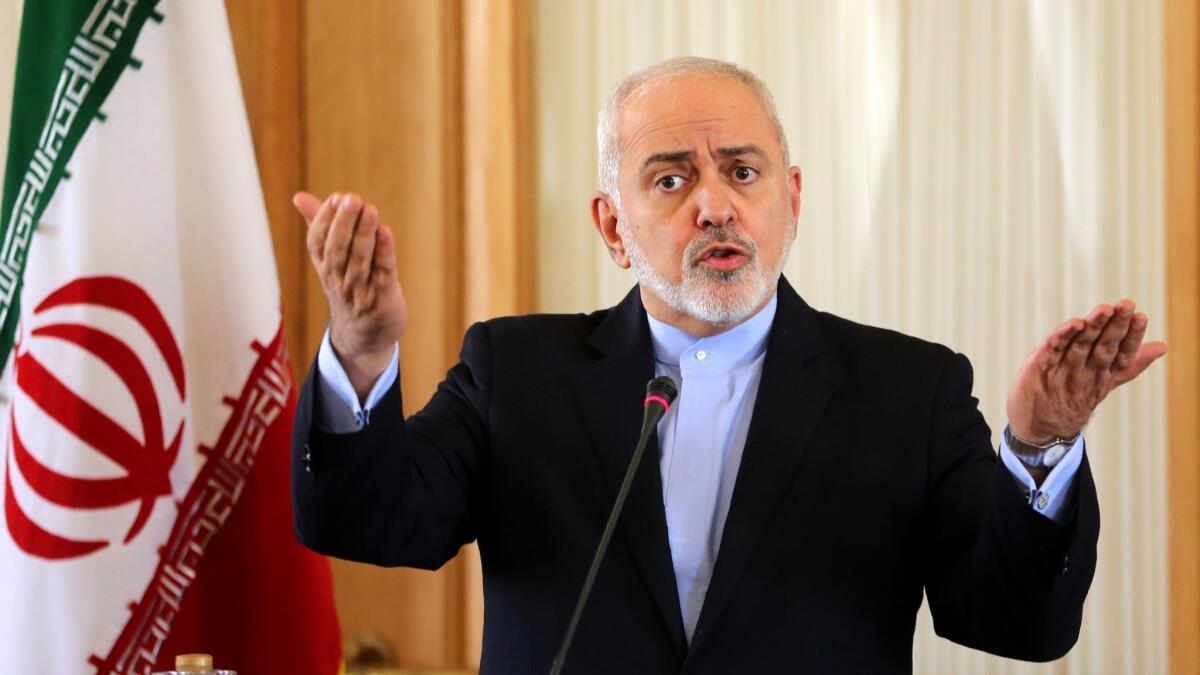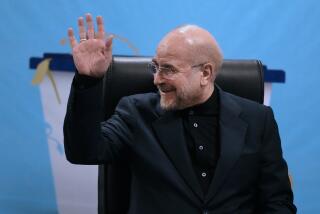Iran’s foreign minister, key figure in negotiating scrapped nuclear pact, resigns

Reporting from Tehran — Iranian Foreign Minister Mohammad Javad Zarif, a pivotal player in negotiating the landmark nuclear pact that President Trump scrapped, announced his resignation Monday.
The popular figure in Iran made the announcement on his Instagram page, a highly unusual public move in the Islamic Republic. President Hassan Rouhani has yet to accept Zarif’s resignation, according to Rouhani’s chief of staff, Mahmoud Vaezi.
For the record:
7:55 p.m. Feb. 25, 2019An earlier version referred to a member of Iran’s parliament as Ali Reza Rahim. His name is Alireza Rahimi.
Zarif wrote on Instagram that he was thankful to have served the Iranian people. “I apologize for the shortcomings during my sincere services. I wish you happiness.” He did not give a reason for the resignation.
The foreign minister’s departure came as Syrian President Bashar Assad was in Tehran to meet with Iranian Supreme Leader Ayatollah Ali Khamenei. Zarif did not attend the meeting, according to multiple local media reports.
The moderate Entekhab News website reported that Zarif told a reporter by text that he felt he no longer had credibility because he was left out of the meeting with Assad, whom Iran has supported since Syria’s civil war began in 2011.
The Assad visit could well have exacerbated Zarif’s frustrations with the internal political struggles between conservative hard-liners and Rouhani’s more reform-minded government, said Abdul Ghasem Golbaf, an Iran analyst based in Tehran.
Iran’s politicians are generally divided between hard-liners who resist change and support Islamic theocracy and reformists who favor greater democracy and social freedoms. In Iran’s hybrid political system, theocrats have the final say.
Zarif, who was educated in San Francisco and Denver, played a key role in the short-lived rapprochement between the U.S. and Iran during the Obama administration.
The foreign minister, who had held various diplomatic postings since the 1990s, was welcomed by cheering crowds when he returned to Iran after breakthroughs in nuclear talks in 2013.
Trump withdrew from the nuclear deal last year and reinstated sanctions. Russia, China, Germany, France and Britain remain in the pact with Iran.
U.S. Secretary of State Michael R. Pompeo responded on Twitter to Zarif’s resignation, calling Iran’s foreign minister and president “just front men for a corrupt religious mafia.”
In reaction to the news of Zarif’s resignation, Jamal Abdi, president of the Washington-based National Iranian American Council, issued a statement: “Zarif’s resignation is a boon for the radical hard-line forces in Tehran who oppose the [nuclear pact] and further engagement with the West.”
Abdi suggested that Trump’s aim in withdrawing from the nuclear pact may be to empower radicals in Iran.
“Hard-liners in the U.S. have long cheered for Iran to be led by radical elements to make engagement difficult and validate calls for sanctions and military action,” he said. “Should Zarif bow out of Iran’s political theater, Trump and his team may be getting exactly what they wish for — and the world will be worse for it.”
Zarif still has wide support in Iran, despite the country’s deteriorating economy. A January 2018 survey from the University of Maryland showed that 68% of Iranians surveyed viewed him favorably.
Mostafa Boroumandi, an owner of a printing house in Tehran, said he was saddened by Zarif’s resignation and worried his business would be negatively impacted. He said Zarif’s resignation is a sign of strife between hard-liners and reformists.
“Zarif was a paralyzed figure, he could not do anything,” Boroumandi said. “His hands were tied.”
Alireza Rahimi, a reformist member of Iran’s parliament, wrote in a tweet that whoever replaces Zarif will “destroy all his achievements.”
“If his resignation is true, then it proves that his opponents have stabbed him in the back,” Rahimi wrote.
Tensions between hard-liners and Rouhani’s government have been increasing since the U.S. withdrew from the nuclear accord. Some clerics have called for Rouhani to resign, blaming his government for Iran’s skyrocketing inflation and crumbling economy.
Hassan Abbasi, a retired hard-line general, said in a speech this month that he believed Iranians would spit on Zarif and others in the government who backed the nuclear deal.
Zarif has also come under pressure from hard-liners who have criticized his attempt to get anti-money laundering bills passed in parliament and his calls for more financial transparency in the country.
In December, hard-liners in parliament sought to impeach Zarif but canceled their motion because they didn’t have enough lawmakers behind it.
Last year, after Trump threatened Rouhani and Iran, using his trademark all-capital letters for emphasis, Zarif responded on the same social media platform: “COLOR US UNIMPRESSED. …We’ve been around for millennia & seen fall of empires, incl our own, which lasted more than the life of some countries. BE CAUTIOUS!”
Zarif has close ties to California. He attended Drew College preparatory school in San Francisco and went on to study at San Francisco State University, where he earned bachelor’s and master’s degrees. He then went on to the University of Denver for a second master’s degree in international relations and a doctorate in international law and policy in 1988.
Times staff writer Tracy Wilkinson contributed to this report from Washington. Staff writer Etehad reported from Los Angeles and special correspondent Mostaghim from Tehran.
More to Read
Sign up for Essential California
The most important California stories and recommendations in your inbox every morning.
You may occasionally receive promotional content from the Los Angeles Times.











